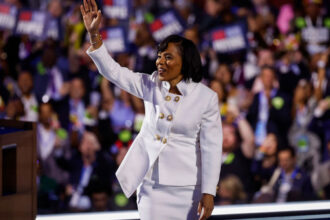VIDEO EXCLUSIVE: Democratic Congressional Nominee Mondaire Jones ‘Will Fight’ For Medicare For All
Mondaire Jones, the Democratic candidate running for Congress (NY-17), “will be a reliable vote” for public insurance options, citing its cost-effectiveness compared to privatized insurance.
“I am going to vote for the best things that Democrats are able to accomplish and so if that ends up being a public option, I will be a reliable vote for a public option even as I fight for Medicare for All, a single-payer system,” Jones told uPolitics founder Erik Meers. “That is the only policy that would literally insure everybody in this country and result in at least $5 trillion in savings over the next ten years, which people don’t talk enough about.”













Leave a comment